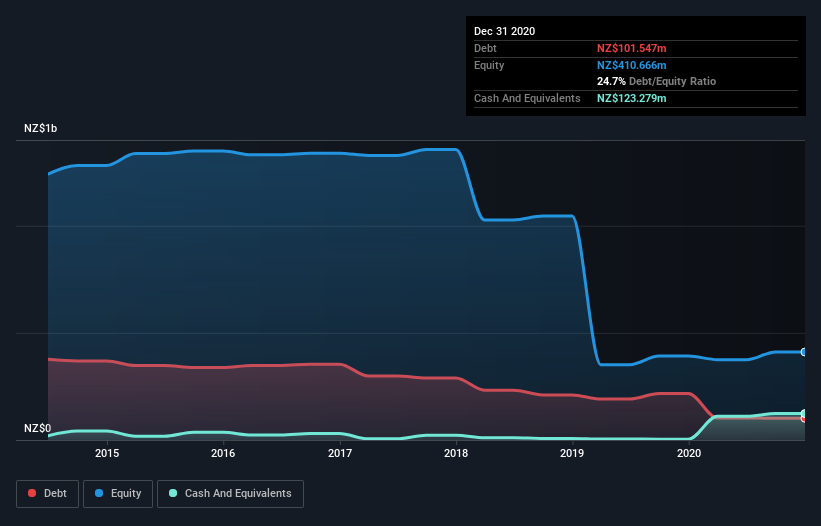SKY Network Television (NZSE:SKT) Has A Pretty Healthy Balance Sheet
The external fund manager backed by Berkshire Hathaway's Charlie Munger, Li Lu, makes no bones about it when he says 'The biggest investment risk is not the volatility of prices, but whether you will suffer a permanent loss of capital.' So it might be obvious that you need to consider debt, when you think about how risky any given stock is, because too much debt can sink a company. Importantly, SKY Network Television Limited (NZSE:SKT) does carry debt. But the real question is whether this debt is making the company risky.
Why Does Debt Bring Risk?
Generally speaking, debt only becomes a real problem when a company can't easily pay it off, either by raising capital or with its own cash flow. Part and parcel of capitalism is the process of 'creative destruction' where failed businesses are mercilessly liquidated by their bankers. However, a more frequent (but still costly) occurrence is where a company must issue shares at bargain-basement prices, permanently diluting shareholders, just to shore up its balance sheet. Having said that, the most common situation is where a company manages its debt reasonably well - and to its own advantage. When we examine debt levels, we first consider both cash and debt levels, together.
View our latest analysis for SKY Network Television
What Is SKY Network Television's Debt?
The image below, which you can click on for greater detail, shows that SKY Network Television had debt of NZ$101.5m at the end of December 2020, a reduction from NZ$217.0m over a year. However, it does have NZ$123.3m in cash offsetting this, leading to net cash of NZ$21.7m.
How Healthy Is SKY Network Television's Balance Sheet?
We can see from the most recent balance sheet that SKY Network Television had liabilities of NZ$325.3m falling due within a year, and liabilities of NZ$57.9m due beyond that. Offsetting this, it had NZ$123.3m in cash and NZ$54.1m in receivables that were due within 12 months. So it has liabilities totalling NZ$205.8m more than its cash and near-term receivables, combined.
This is a mountain of leverage relative to its market capitalization of NZ$297.0m. Should its lenders demand that it shore up the balance sheet, shareholders would likely face severe dilution. Despite its noteworthy liabilities, SKY Network Television boasts net cash, so it's fair to say it does not have a heavy debt load!
And we also note warmly that SKY Network Television grew its EBIT by 16% last year, making its debt load easier to handle. The balance sheet is clearly the area to focus on when you are analysing debt. But ultimately the future profitability of the business will decide if SKY Network Television can strengthen its balance sheet over time. So if you want to see what the professionals think, you might find this free report on analyst profit forecasts to be interesting.
Finally, while the tax-man may adore accounting profits, lenders only accept cold hard cash. SKY Network Television may have net cash on the balance sheet, but it is still interesting to look at how well the business converts its earnings before interest and tax (EBIT) to free cash flow, because that will influence both its need for, and its capacity to manage debt. Over the last three years, SKY Network Television recorded free cash flow worth a fulsome 87% of its EBIT, which is stronger than we'd usually expect. That positions it well to pay down debt if desirable to do so.
Summing up
Although SKY Network Television's balance sheet isn't particularly strong, due to the total liabilities, it is clearly positive to see that it has net cash of NZ$21.7m. The cherry on top was that in converted 87% of that EBIT to free cash flow, bringing in NZ$123m. So we are not troubled with SKY Network Television's debt use. The balance sheet is clearly the area to focus on when you are analysing debt. However, not all investment risk resides within the balance sheet - far from it. For example - SKY Network Television has 1 warning sign we think you should be aware of.
If you're interested in investing in businesses that can grow profits without the burden of debt, then check out this free list of growing businesses that have net cash on the balance sheet.
This article by Simply Wall St is general in nature. It does not constitute a recommendation to buy or sell any stock, and does not take account of your objectives, or your financial situation. We aim to bring you long-term focused analysis driven by fundamental data. Note that our analysis may not factor in the latest price-sensitive company announcements or qualitative material. Simply Wall St has no position in any stocks mentioned.
Have feedback on this article? Concerned about the content? Get in touch with us directly. Alternatively, email editorial-team (at) simplywallst.com.

 Yahoo Finance
Yahoo Finance 
